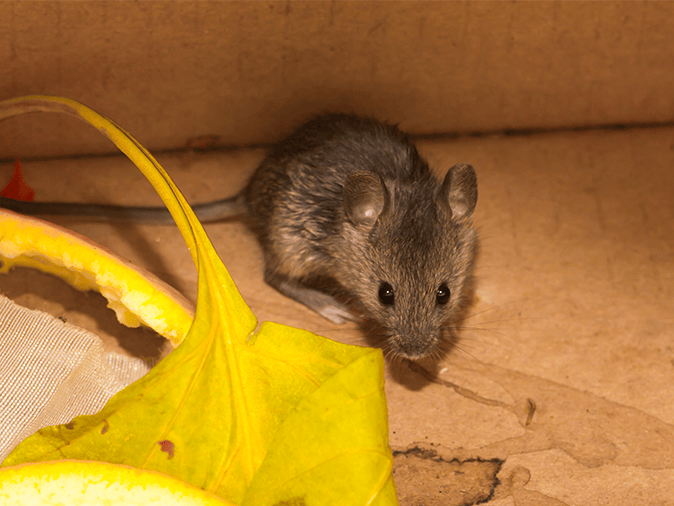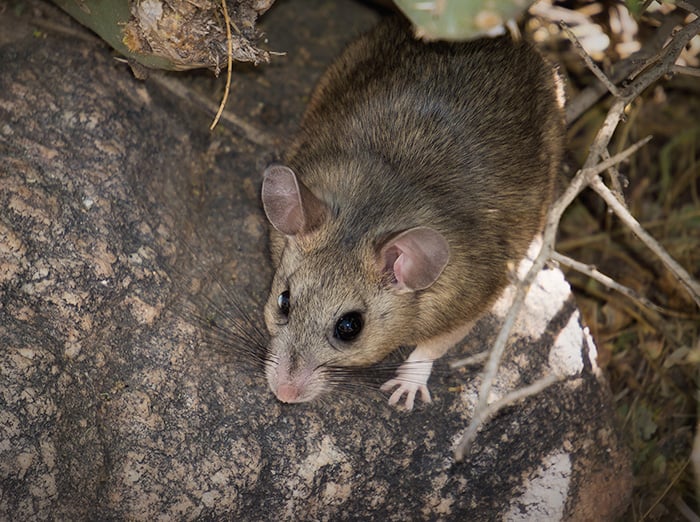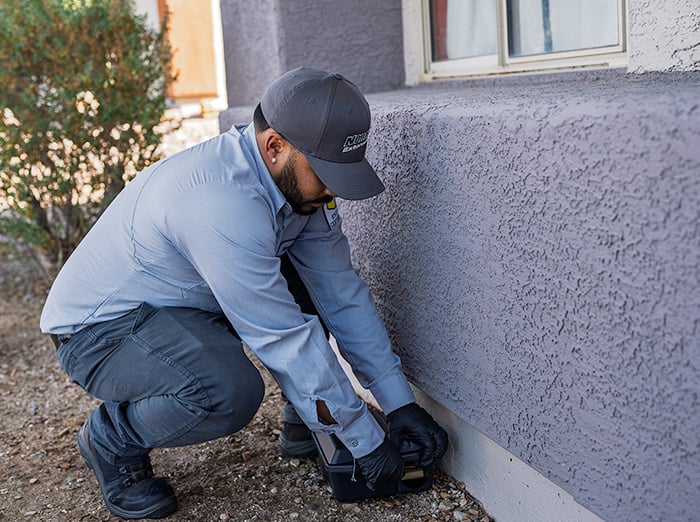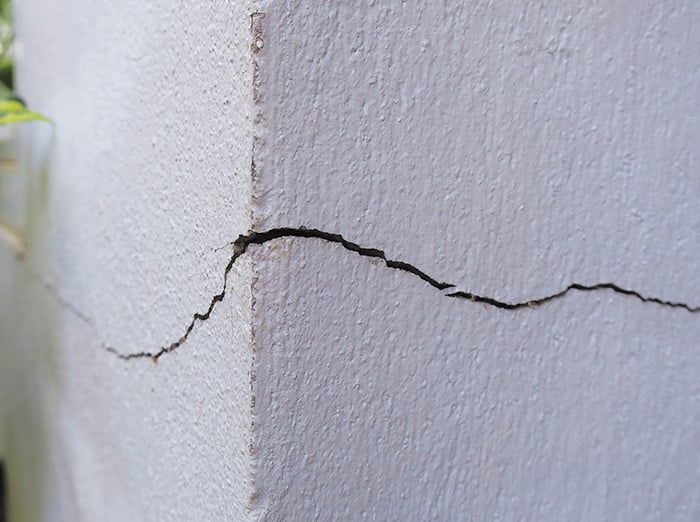
What do mice look like?
- A house mouse is about 2 to 4 inches long with an equally long tail.
- The tail of a house mouse is long, thin, and visibly hairless.
- Most house mice appear gray, dark gray, or black, but some populations are brown with tiny black hairs mixed into their coats.
- Mice have small ears, black eyes, and conical noses.
While it is easy to identify a house mouse, finding one is more challenging. They are nocturnal animals, and their dark coloration helps them blend into the shadows. They’re also incredibly quiet. There’s a reason people say, “Quiet as a mouse.”
When are house mice most active?
What do mice eat?
House mice are opportunistic in their feeding habits. They eat various foods and dine on whatever they can find. They’ll get into food cabinets and pantries to get a bite or simply eat the crumbs off the floor. It doesn’t take much to feed a little mouse.
Before mice enter homes, they’re often attracted to properties by bird seed that falls to the ground. They also eat nuts, fruit, bugs, and other natural foods. Managing food options can help you mitigate the risk of a rodent infestation.
Mice are strongly motivated by food and will eat 10% of their body weight daily if they can. These animals want to live as close to food sources as possible and don’t prefer to live in homes free of food debris and other food options.
Do mice reproduce fast?
You bet they do! It is startling how fast mice reproduce. In fact, many DIY mouse control efforts fail because mice can breed faster than property owners can remove them with traps.
Mice find protection from predators and ecological challenges indoors. In homes and other structures, mice breed uninhibited, year-round, producing up to 10 litters annually. Each litter can have 2 to 13 pups. Baby mice reach sexual maturity in 6 to 10 weeks and can breed and help grow the population.
Are house mice dangerous?
Hantavirus is a virus found in rodent urine, saliva, and feces. It will infect lungs and can cause HPS (Hantavirus Pulmonary Syndrome). The first symptoms will begin about two weeks after exposure to mice and will include:
- High fever
- Body aches
- Chills
- Trouble breathing
- Abdominal pain
- Lower back pain
A couple of days after these symptoms start, severe respiratory distress will begin and lungs will shut down. HPS is very serious but with advanced medical care, most people do survive the infection.
Additionally, mice are capable of introducing other illness and may cause damage to the structure and the belongings.
- Their excrement and urine are potential sources for disease transmission.
- They pick up germs with their hair and spread them to sanitary surfaces.
- They carry ticks, which are known to spread many diseases.
- They soil insulation and stored items with their waste materials.
- They gnaw and claw stored items.
- They gnaw on building materials.
- They create holes that can allow rainwater in, particularly during monsoon season.
It is best to keep these little rodents outdoors if possible.
How do mice get into homes?
Mice are skilled at finding the tiniest openings in the exterior of buildings. They can get in from bottom to top. Here are a few examples:
- They slip past gaps in weatherstripping or sweeps on exterior doors.
- They slip through tiny structural holes or cavities.
- They squeeze between damaged foundation slabs and building materials.
- They get into unprotected or broken vents.
- They slip through gaps around A/C and utility lines.
- They scale trees and poles and use wires to get onto roofs.
- They enter through damaged seals around roof penetrations.
Mice commonly hide in exterior hiding places such as dense vegetation or wood piles before getting inside. They’re also prone to enter homes that have crawl spaces or exterior decks with storage underneath.
What are the signs of a mouse infestation?
If you think you might have a mouse infestation, here are a few warning signs to confirm your suspicions.
- Droppings
Small, dark-colored, rice-like fecal matter is one of the first signs that mice are lurking. You’ll find feces near food and in secluded spaces. - Damage
Mice chew on things to file their teeth. You may notice damage to wood and other building materials or holes in food packaging if you have mice. - Tracks
Mice leave their little paw marks when they explore, particularly on dirty or dusty surfaces. - Nocturnal noises
Mice sometimes make scratching, bumping, or squeaking noises as they move inside walls. Remember that mice are nocturnal, so you’re not likely to hear noises during the day. - Nests
Mice create fluffy, balled-up nests out of materials they find in your home, such as cushion stuffing, fabric, lint, insulation, etc.
If you find any of these warning signs in your home, it is a good indication that you have a mouse problem. Contact Northwest Exterminating for an inspection and treatment options.
Where do mice nest?
In exterior desert environments, mice live in ground burrows in the root systems of trees and plants or underneath dense vegetation. When they find their way into your home, they’ll likely come from their nesting and hiding places in your yard. Consider trees, plants, and ground clutter near the exterior of your home. Once they get inside, they’ll nest in:
- Wall voids
- The attic
- Around appliances
- Cabinets
- Storage lockers
- Water heater room
- Closets
- Under sinks
- The garage
Consider indoor food sources, as mice want to live near these.
How do you get rid of house mice?
Don’t let mice take over your home; contact Northwest Exterminating at the first sign of a problem! Our pest control company offers rodent control in Phoenix, Tucson, and elsewhere in Southern Arizona, including rodent trapping, baiting, and more! We also offer year-round home pest control services that include digital rodent monitoring.
Can I prevent a mouse infestation?
While our pest control team can give you the best rodent prevention tips for your property, there are many ways you can work to prevent a mouse problem. Here are a few of our suggestions:
- Remove bird feeders around your exterior, as these attract mice.
- Protect exterior fruit or berry plants.
- Keep trash receptacles covered.
- Inspect your exterior and seal all gaps, cracks, crevices, and cavities.
- Repair screens.
- Protect vents and weep holes.
- Replace weatherstripping or sweeps where needed.
- Keep your home clean and free of food debris.
- Keep food covered.
- Stored bread, cereal, and other human foods mice prefer in sealed containers.
- Eliminate weeds in your yard.
If you have questions about mouse control in Arizona, the Northwest Exterminating team is here to help. You can reach out to us at any time.

Testimonials
Request Your FREE Estimate
Have questions or need help getting rid of house mice or other pests? Simply complete the form below or give us a call!



